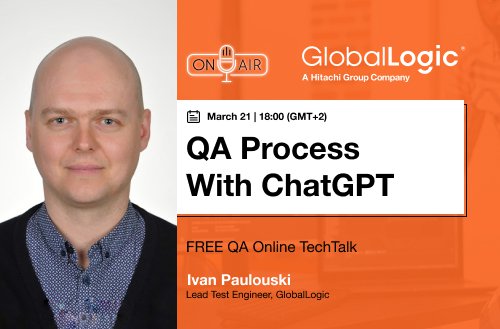- Services
Technology Capabilities
Technology Capabilities- Product Strategy & Experience DesignDefine software-driven value chains, create purposeful interactions, and develop new segments and offerings
- Digital Business TransformationAdvance your digital transformation journey.
- Intelligence EngineeringCreate high-value products faster with AI-powered and human-driven
- Software Product EngineeringCreate high-value products faster with AI-powered and human-driven engineering.
- Technology ModernizationTackle technology modernization with approaches that reduce risk and maximize impact.
- Embedded Engineering & IT/OT TransformationDevelop embedded software and hardware. Build IoT and IT/OT solutions.
- Industries
- GlobalLogic VelocityAI
- Insights
White PapersSeptember 17, 2024Diana SocaciuElevating Romanian Tourism with GlobalLogic: Apuseni App
The innovative banking apps, such as the one we'll explore in this case study, succeed ...
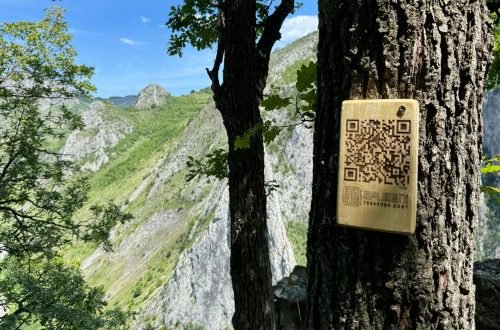 Case StudiesGlobalLogic
Case StudiesGlobalLogicFrom Legacy to Leading-edge: A Global Software Leader’s ...
Discover how GlobalLogic’s AI-powered solutions helped a global software leader migrate...

- About
Celebrating 10 Years of Partnership with the DPIT Academy and the Mentors Behind It
For ten years now, the start of summer has signified the launch of a new edition of the “Discover Your Passion in IT” (DPIT) Academy. Over the past decade, we have had the privilege of encouraging high school students to dive into the exciting world of IT. Originally partnering as Fortech, we are now proud to continue this collaboration as GlobalLogic, fostering a new generation of tech enthusiasts and innovators within the local IT community.
The Discover Your Passion in IT Association (DPIT) is a non-governmental, non-profit organization that offers practical education and mentoring programs to support young people during their formative years. But what exactly is our role in the program?
This year, we were proud to participate once again, with five teams guided by our dedicated mentors from Cluj-Napoca and Oradea. Our experienced colleagues devoted their time and expertise to help students explore new ideas, develop solutions, and grow both personally and technically.
In this blog article, we want to take a moment to spotlight the mentors who make this journey possible. Their dedication to guiding the next generation is the driving force behind our participation in the DPIT Academy, making our role truly impactful.
Here’s what they coordinated:
PoseTrack – Mentor Ciprian Cornea
Motiss – Mentor Andreea Irinca
CyberAgency – Mentor Sasha Semeniuc
Otto’s World – Mentor Daniel Bran
MedTech Innovators – Mentor Levente Hegyi
Ciprian Cornea – Software Engineer, Cluj-Napoca – mentor of PoseTrack
1. What is the main objective or problem your team’s product aims to solve?
PoseTrack aims to solve the problem of poor posture, which is common in our digital era. Many people spend long hours sitting at desks or looking down at their phones, leading to issues like back pain, neck strain, and fatigue. Our solution uses sensors placed on the back to monitor posture in real time. When users have poor posture, the system alerts them and provides tips on how to improve it. Our goal is to help people develop better habits and avoid long-term health problems.
2. How did your mentorship activity influence the decision-making process throughout the product’s development?
My mentorship activity helped the team make informed decisions by guiding them to think about both technical feasibility and user needs. I led brainstorming sessions and provided feedback to keep their ideas aligned with the project’s goals. This approach allowed the team to stay focused, prioritize tasks, and create a more user-friendly product
3. Can you describe a moment when your mentorship activity provided a fresh perspective that changed the course of the product development?
A key moment came when I encouraged the team to prioritize the user experience, especially the clarity of posture feedback. This shift prompted us to redesign the app’s interface, making it more intuitive and user-friendly. As a result, users interacted better with the product and received clearer suggestions for improving their posture.
4. How was your overall mentoring experience?
My mentoring experience has been very rewarding. It has been fulfilling to watch the team grow, overcome challenges, and improve their ideas. By guiding them through the development process, I helped them create a strong product and boosted their confidence and skills for future projects.
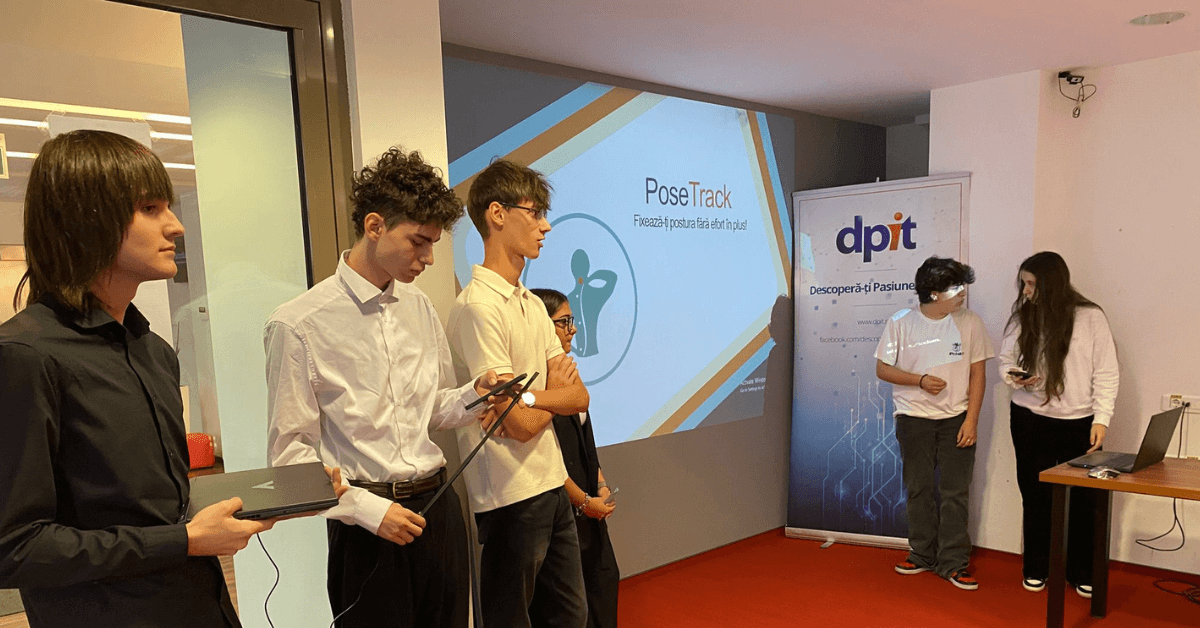
PoseTrack presenting their product at the project’s evaluation.
Andreea Irinca – BA/PO Competency Lead, Cluj-Napoca – mentor of Motiss
1. What is the main objective or problem your team’s product aims to solve?
Their idea began with statistics indicating that many Romanians have limited access to mental health services; for example, only 11% of Romanians have ever participated in a psychotherapy session. The team aims to provide easy access to support materials for better mental health by building a web platform that offers an online alternative for therapy and mental well-being.
2. How did your mentorship activity influence the decision-making process throughout the product’s development?
I believe that my knowledge and perspective significantly influenced the decision-making process in a positive manner. I consistently aimed for clarity while encouraging the team to carefully consider potential risks. By fostering an open environment for discussion and critical thinking, I helped the team make informed choices that balanced innovation with practicality. This approach not only enhanced our strategic direction but also built confidence in our ability to tackle challenges effectively.
3. Can you describe a moment when your mentorship activity provided a fresh perspective that changed the course of the product development?
One key moment was the review and adjustment of the design mockups for the Motiss mental health platform. After considering my feedback, the students made several changes to the colors, user flows, and overall approach to user interaction. They aimed to create a welcoming experience that would not overwhelm users, simplifying the process to ease their transition into using the app.
4. How was your overall mentoring experience?
This mentoring experience was both challenging and unexpected; it turned out to be quite different from what I had anticipated. I truly appreciated the openness of the students and the sincere communication we established from day one.
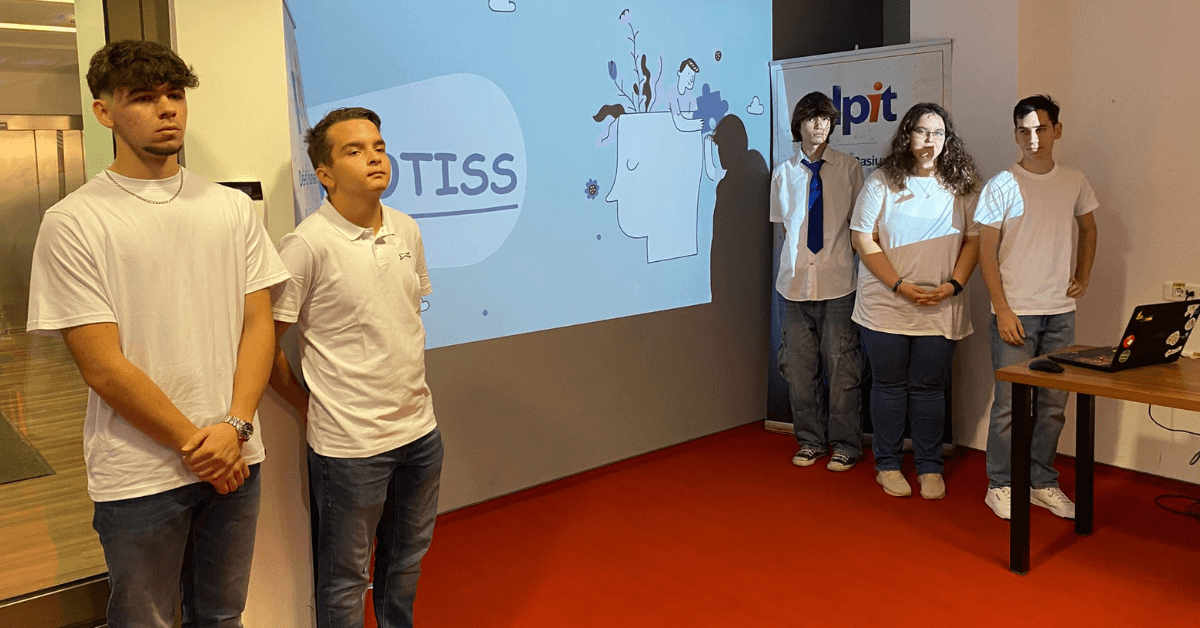
Motiss presenting their product at the project’s evaluation.
Sasha Semeniuc – Software Engineer, Cluj-Napoca – mentor of CyberAgency
1. What is the main objective or problem your team’s product aims to solve?
CyberAgency’s primary objective is to develop an AI-driven phone agent that can handle tasks such as taking orders, booking appointments, and managing schedules. In today’s fast-paced business environment, effective communication with customers is essential. Our solution offers businesses an automated and reliable way to interact with customers, regardless of time or volume.
The rapid advancement of AI technologies has enabled high school students to create this product, a feat that would have been impossible just a few years ago. By leveraging these innovations, we aim to simplify customer interactions, reduce operational challenges, and enhance overall customer satisfaction through a fully automated system.
2. How did your mentorship activity influence the decision-making process throughout the product’s development?
I dedicated myself to using my experience to help the team accurately estimate their tasks and offered guidance whenever they encountered technical challenges. Additionally, as a fan of Y Combinator’s teachings, I recommended several relevant videos from their resources that I had personally found helpful. I believed these resources would assist the team in making more informed decisions regarding product development.
3. Can you describe a moment when your mentorship activity provided a fresh perspective that changed the course of the product development?
During development, the team was primarily focused on optimizing the AI to efficiently manage customer inquiries. They initially aimed to handle all possible scenarios simultaneously, which complicated the architecture early on. Drawing from my experience, I suggested they take a step back and concentrate on perfecting a few high-impact tasks—such as booking appointments and taking orders—before expanding to broader use cases.
4. How was your overall mentoring experience?
Mentoring this team was a rewarding experience. Watching high school students engage with AI technology that was previously only available to large companies was truly inspiring. They faced challenges in balancing ambition with practicality, which I could relate to.
What stood out to me was their eagerness to learn and adapt. They weren’t afraid to ask tough questions or challenge ideas, including mine, which led to productive discussions about the product’s direction. Seeing them progress from early prototypes to a system capable of addressing real communication challenges felt like a significant win for both them and the mentorship process.
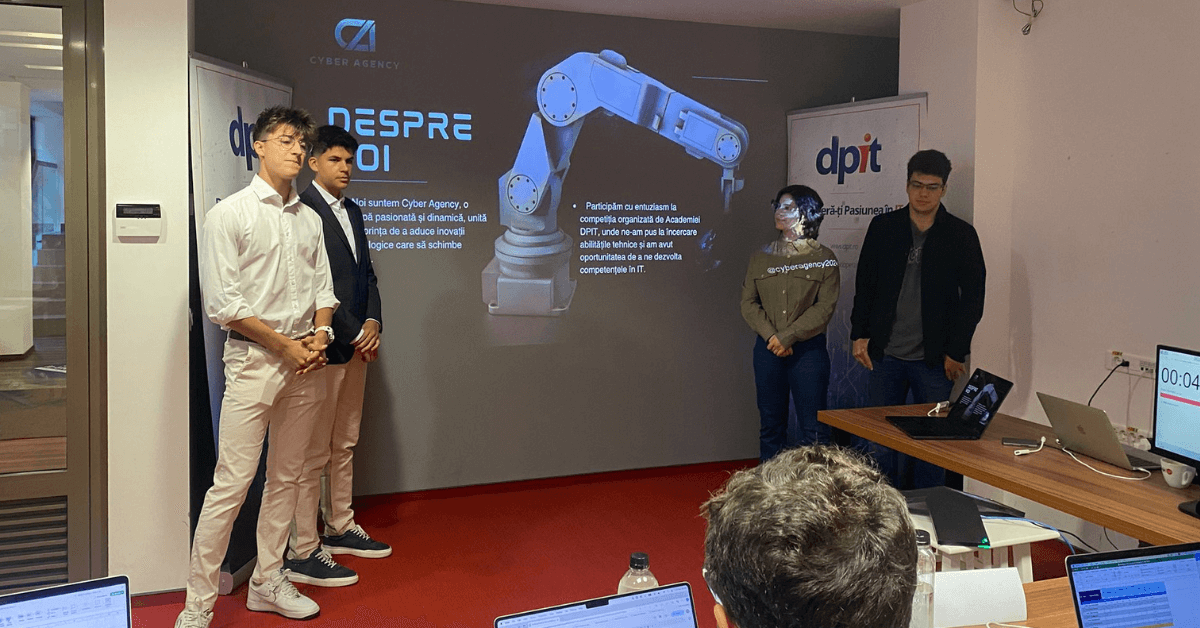
CyberAgency presenting their product at the project’s evaluation.
Daniel Bran – .NET Competency Lead, Oradea– mentor of Otto’s World
1. What is the main objective or problem your team’s product aims to solve?
We identified the need to educate both children and adults about online fraud prevention. As online payments have become the norm, some individuals attempt to take advantage of others through scams. To address this issue, we developed an application that trains children to recognize common attacks and make the internet a safer place. We created the Otto’s World application to help users learn how to manage their money online securely.
2. How did your mentorship activity influence the decision-making process throughout the product’s development?
This year was very productive. The team generated many ideas, and I made a conscious decision to listen more to their voices. I recommended creating something visual, such as a proof of concept (POC) or a spike, which the team could then review and comment on from their perspectives. The team was very responsive, and when they didn’t have input, we used the initial perspective as a foundation for product development.
3. Can you describe a moment when your mentorship activity provided a fresh perspective that changed the course of the product development?
We want to ensure that the application is ready for the contest, and the team has generated many brilliant ideas. However, we had to cut corners and concentrate on the main functionality. I suggested that we focus on the introductory modules first, and if time permits, we can develop the additional features later. With the limited time available for product development, we needed to prioritize the most important features. As a result, the roadmap was adjusted, and we were able to deliver on time.
4. How was your overall mentoring experience?
The experience was incredibly rewarding. I really enjoy this role because I want to help others grow not only in their technical skills but also in their soft and emotional skills. I recommend this experience to anyone planning to take on a leadership role, as it will provide valuable insights into being a mentor and a project leader.
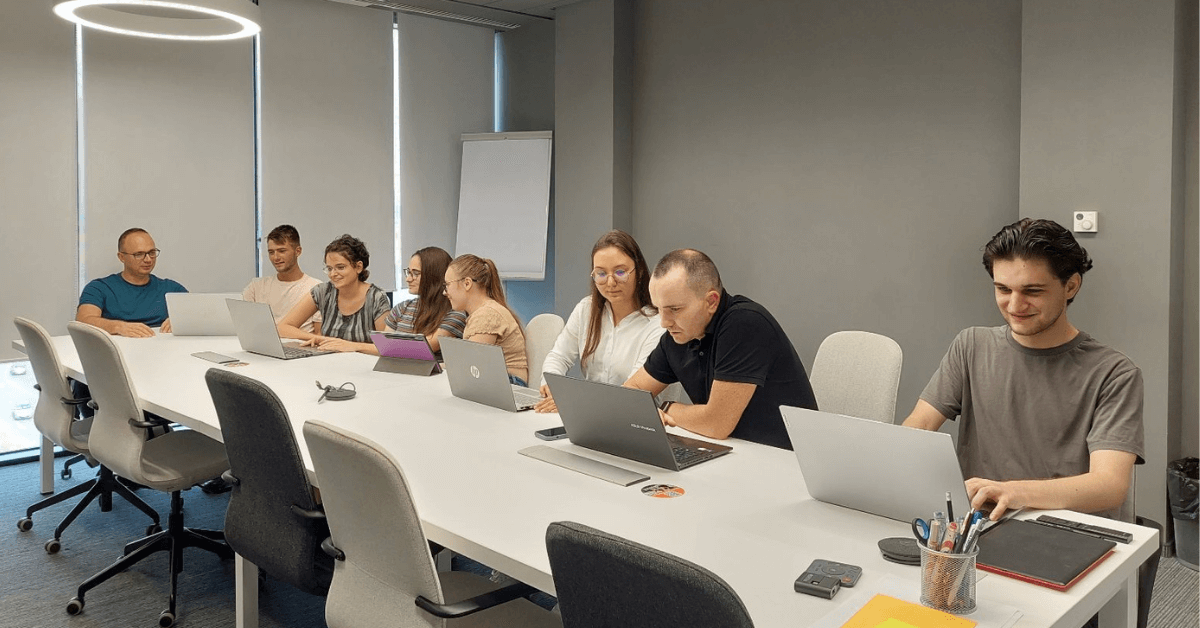
Daniel with his team at GlobalLogic Oradea office.
Levente Hegyi – Software Engineer, Oradea – mentor of MedTech Innovators
1. What is the main objective or problem your team’s product aims to solve?
MedTech Innovators aims to tackle the critical issue of timely access to emergency medical care. Our application, Heading2Health, provides users with real-time information on nearby hospitals, including their available capacity and estimated travel times. This ensures that patients can reach the appropriate medical facility quickly and efficiently. By streamlining this process, we hope to reduce delays in receiving urgent medical attention and ultimately save lives.
2. How did your mentorship activity influence the decision-making process throughout the product’s development?
As a mentor, I focused on guiding the team rather than directly influencing their decisions. We held weekly in-person meetings with the entire team, as well as separate online sessions for the backend and frontend groups. My role was to help the team refine their ideas into achievable goals within the given timeframe. I encouraged them to break down tasks into smaller, manageable pieces, ensuring that everyone understood their responsibilities in the project.
3. Can you describe a moment when your mentorship activity provided a fresh perspective that changed the course of the product development?
One pivotal moment in our product development was the decision on which programming language to use. I encouraged the team to select a language that was challenging enough to provide a solid learning experience while also being relevant for their future professional growth. This decision was crucial in establishing a strong foundation for continuous learning.
Another significant challenge was prioritizing the essential functionalities of our application, given its critical use in emergency situations. We had to carefully select features that were necessary, ensuring that our application remained efficient and focused on saving time—an essential factor in emergencies.
4. How was your overall mentoring experience?
My overall mentoring experience has been incredibly positive, yet also challenging. The dual focus of the program—on both professional development and creating a real-world application for the community—presented a unique set of challenges. Despite these difficulties, I had the privilege of working with a group of young individuals with tremendous potential and distinct personalities. As the program ends, I will always look back fondly on the time spent with the team and the application we built together. I’m confident that each member is destined for great accomplishments, and I look forward to hearing about their future successes.
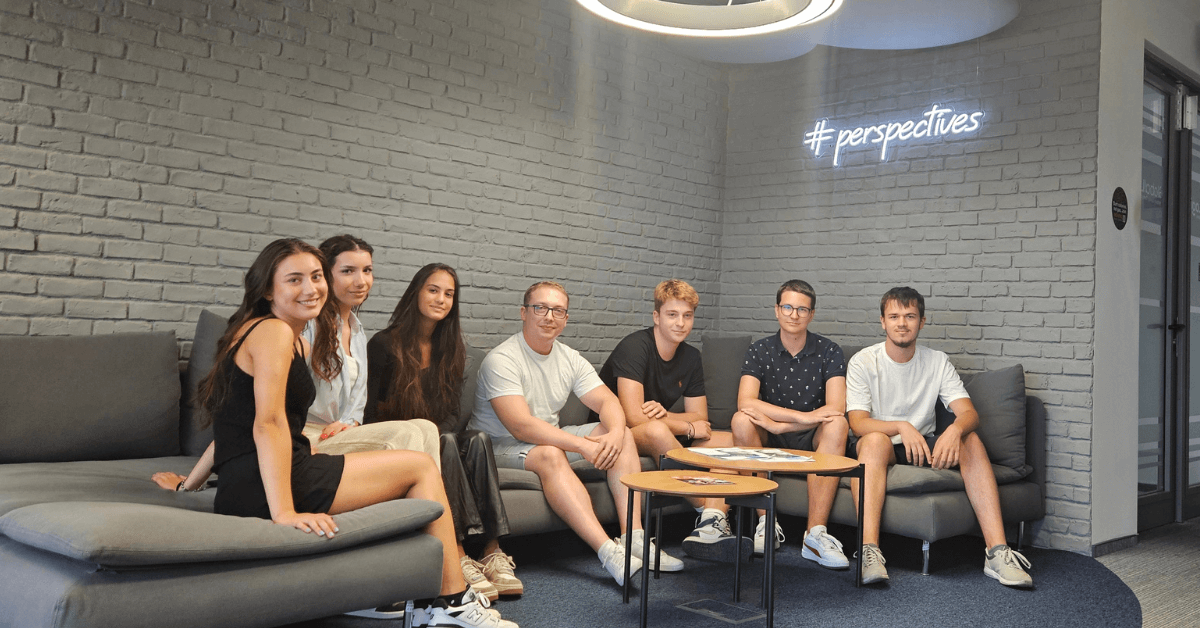
Levente with his team at GlobalLogic Oradea office.
As a conclusion, the journey through the DPIT Academy is not just about teaching technical skills, it’s about inspiring the next generation to unlock their potential and discover their passion for IT. The dedication of our mentors from Cluj-Napoca and Oradea exemplifies the core of this program—nurturing curiosity, innovation, and personal growth. As we continue this rewarding partnership, now as GlobalLogic, we remain committed to shaping the future of technology by empowering young minds.

